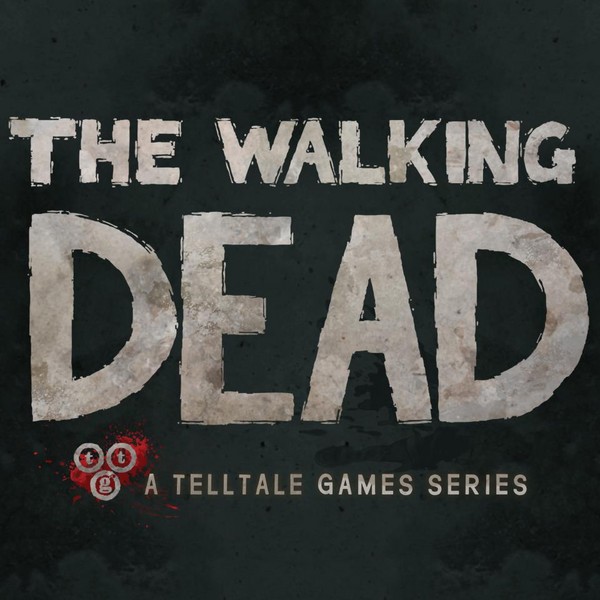 I loved the first Episode of Walking Dead. I mean I REALLY loved it. It was a point and click game but combined aspects of realtime action scenes with an interactive storylines, dialogue options, and life and death choices, and it even blended in elements of games like Heavy Rain (minus all the pointless fiddling with radios and rolling down car windows). Every time you interacted with the environments or the characters in Walking Dead Episode 1 it felt important and crucially, you were always advancing the story. It was a mish-mash of different genres that worked brilliantly. It was as as successful as any narrative led game has ever been at combining tightly scripted interactive storytelling with gameplay and player choice.
I loved the first Episode of Walking Dead. I mean I REALLY loved it. It was a point and click game but combined aspects of realtime action scenes with an interactive storylines, dialogue options, and life and death choices, and it even blended in elements of games like Heavy Rain (minus all the pointless fiddling with radios and rolling down car windows). Every time you interacted with the environments or the characters in Walking Dead Episode 1 it felt important and crucially, you were always advancing the story. It was a mish-mash of different genres that worked brilliantly. It was as as successful as any narrative led game has ever been at combining tightly scripted interactive storytelling with gameplay and player choice.
With such a strong opening, all Telltale had to do is keep the story on track and maintain the high quality of writing. More difficulty though, they also had to carry choices forward from the first episode in a meaningful way (and they will continue to have to do this throughout the series of games). I am pleased to say they have been successful.
The game picks up some three months after the events of the original. While the first episode saw the zombie (sorry, “Walker”) outbreak close to day zero, the world in episode 2 is much closer to what we see later in the comics or TV series. The Governments and military are not going to ride in and save the day and this is not an isolated outbreak. Hope is in short supply. So too is food, and the search for a hot meal is the primary driving force throughout this episode for the starving survivors.
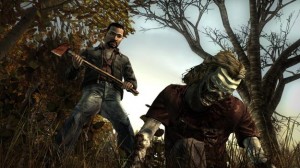 You continue to play as Lee Everett, former history teacher who has been accused of murder and who seemed destined for jail at the beginning of episode 1. Obviously a decent individual with a complex backstory that is only just beginning to be revealed, Lee is a compelling character despite being a convincing every-man type. He can fight well enough, but still finds himself out-muscled or out-gunned by other members of the group. He also has a general blind spot for manual or skilled work, often saying things like “A generator. I’m terrible at these things, I have no idea how it works.” This is a nice touch; Lee is a history teacher and a middle class man out of his depth when surrounded by much more practical characters like Kenny who has a boat and fishes.
You continue to play as Lee Everett, former history teacher who has been accused of murder and who seemed destined for jail at the beginning of episode 1. Obviously a decent individual with a complex backstory that is only just beginning to be revealed, Lee is a compelling character despite being a convincing every-man type. He can fight well enough, but still finds himself out-muscled or out-gunned by other members of the group. He also has a general blind spot for manual or skilled work, often saying things like “A generator. I’m terrible at these things, I have no idea how it works.” This is a nice touch; Lee is a history teacher and a middle class man out of his depth when surrounded by much more practical characters like Kenny who has a boat and fishes.
The gameplay remains very similar to the first episode as well. You move around each environment with movement keys, but can also click on objects or characters to walk to them and interact with them. Dialogue is generally timed, with different dialogue options affecting what characters think of you and what will happen next. One of the nice aspects of this is that silence is an option, and in fact sometimes the best strategy is just to stay quiet and let other character make their own assumptions. If you play the game with the default settings, you will see messages pop up on screen that tell you things like “Kenny thinks you are lying”, or “Glen now trusts you more”. You can choose not to see these messages, but for me they helped reinforce the fact that the dialogue choices I was making were influencing characters and events further down the line.
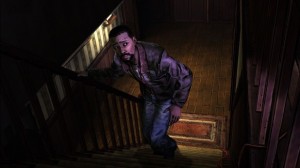 The action scenes are effective in this episode too. The stealth moments in particular work well. In these sections you move from one area to the next keeping low and using cover to hide from enemies while choosing how to deal with them without attracting more opponents. The clever thing about these moments is that they are tense but require careful and creative decision making rather than reactions or precise character movements. They are like puzzles that you piece together bit by bit, and the camera angles that are used heighten the tension brilliantly. With most modern games giving the player camera control, its amazing to see what a creative games developer can do with fixed camera angles designed to make key scenes more dramatic.
The action scenes are effective in this episode too. The stealth moments in particular work well. In these sections you move from one area to the next keeping low and using cover to hide from enemies while choosing how to deal with them without attracting more opponents. The clever thing about these moments is that they are tense but require careful and creative decision making rather than reactions or precise character movements. They are like puzzles that you piece together bit by bit, and the camera angles that are used heighten the tension brilliantly. With most modern games giving the player camera control, its amazing to see what a creative games developer can do with fixed camera angles designed to make key scenes more dramatic.
The characters that were introduced in the first episode are refined and fleshed out substantially, and this is achieved by putting them through increasingly difficult situations fraught with difficult moral questions. There are some genuine gut-punches throughout Episode 2, with many moments evoking the toughest parts of the comic book. Over and over again you think to yourself, “how much more of this can they endure?”. Two of the key characters start the game at loggerheads and the events that follow push them more and more into conflict as leadership of the group is called into question. The drama is convincing and the characters motivations are believable. You can hear two people argue and understand both their viewpoints while agreeing with both, only one, or neither.
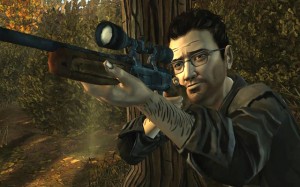 I’m writing this article as spoiler free as I can, as revealing plot details could ruin not just this episode but its predecessor too, but it would be remiss to avoid talking about characters altogether. For me, the character of Kenny is fantastic. Friendly and affable, he comes off initially as a red-neck Ned Flanders and he is quick to help. He also battles against a very human vulnerability and has a cowardly streak which means he can never be relied on in a crisis. This conflicts with some of the less charismatic figures in the team who are socially awkward and frequently infuriating, but who are reliable and trustworthy when the proverbial zombie brains hit the fan.
I’m writing this article as spoiler free as I can, as revealing plot details could ruin not just this episode but its predecessor too, but it would be remiss to avoid talking about characters altogether. For me, the character of Kenny is fantastic. Friendly and affable, he comes off initially as a red-neck Ned Flanders and he is quick to help. He also battles against a very human vulnerability and has a cowardly streak which means he can never be relied on in a crisis. This conflicts with some of the less charismatic figures in the team who are socially awkward and frequently infuriating, but who are reliable and trustworthy when the proverbial zombie brains hit the fan.
Most impressively, even after just two episodes Kenny has already moved through a character arc. He may have seemed like the moral guardian and the “good” guy to side with in the first game, but he has become morally conflicted and is too willing to abandon his own rules when it suits him. He “thinks” he would do anything to protect his family, but already his character seems to be losing the plot and in my game Lee’s relationship with him has started to break down badly.
 The choices that I have made in the first episode have played into this one in serious and interesting ways. Balancing out these choices with a convincing story is by far the biggest challenge that Telltale will face in this game series. So far they have done well. In the case of Lee’s relationship with Kenny, he would often bring up times that Lee had let him down in the past. For the most part this worked and would remind you of difficult choices you had made previously, lending weight to those choices. There were times though where I experienced awkward shifts in tone. Occasionally a character would go from a cheery and friendly disposition to a surly one as they mentioned some previous choice I had made. Obviously if the previous choice had been one they agreed with then the tone would stay the same, but it seems that when your choices go against what the designers guessed you would do the behaviour of the NPC’s can become a bit schizophrenic.
The choices that I have made in the first episode have played into this one in serious and interesting ways. Balancing out these choices with a convincing story is by far the biggest challenge that Telltale will face in this game series. So far they have done well. In the case of Lee’s relationship with Kenny, he would often bring up times that Lee had let him down in the past. For the most part this worked and would remind you of difficult choices you had made previously, lending weight to those choices. There were times though where I experienced awkward shifts in tone. Occasionally a character would go from a cheery and friendly disposition to a surly one as they mentioned some previous choice I had made. Obviously if the previous choice had been one they agreed with then the tone would stay the same, but it seems that when your choices go against what the designers guessed you would do the behaviour of the NPC’s can become a bit schizophrenic.
Other than these criticisms its hard to see what more you could want from Walking Dead Episode 2. The actual storyline of the second episode is both darker and grimmer than the first, and all of the personal relationships are strained as the survivors are forced into one horrible choice after another. In particular, the denouement of this episode takes the game away from the horror of the “Walkers” and shows you the depths and depravity of the humans who are part of the story.
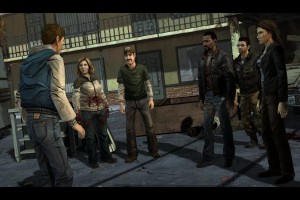 There are even tweaks to the technical aspects of this second aspect. The whole thing looks brighter and less washed out, while the voice acting seems better all round. The high point of the visuals are the camera angles used throughout, which work even better than they did in the first episode. Facial animations also seem improved, with little micro-expressions flitting over characters faces giving away their mental states.
There are even tweaks to the technical aspects of this second aspect. The whole thing looks brighter and less washed out, while the voice acting seems better all round. The high point of the visuals are the camera angles used throughout, which work even better than they did in the first episode. Facial animations also seem improved, with little micro-expressions flitting over characters faces giving away their mental states.
The Walking Dead games are fast becoming the template for how episodic gaming should be done. High quality releases that make sense in a serial format, these games show how competent Telltale has become in this arena. This new episode is more violent, scarier, longer and more shockingly brutal than the first. If you like narrative, you should play this. If you like The Walking Dead, you should play this. If you like things that are awesome….. I think you get the idea.
9 Shoot them in the heads (again)! out of 10
